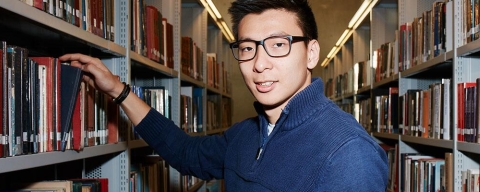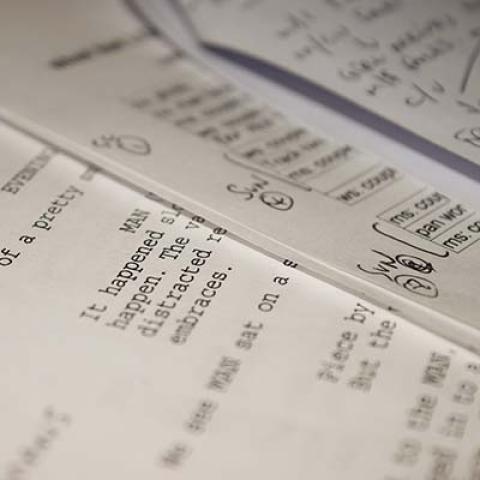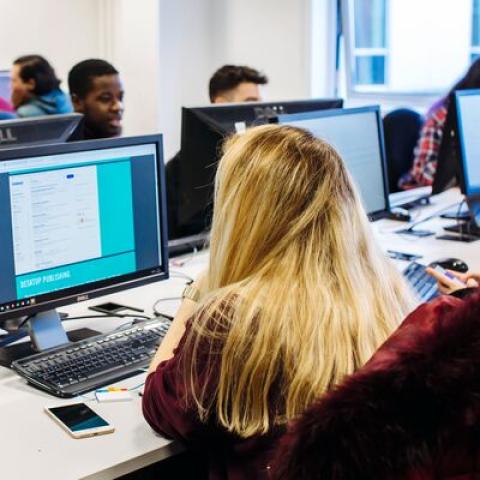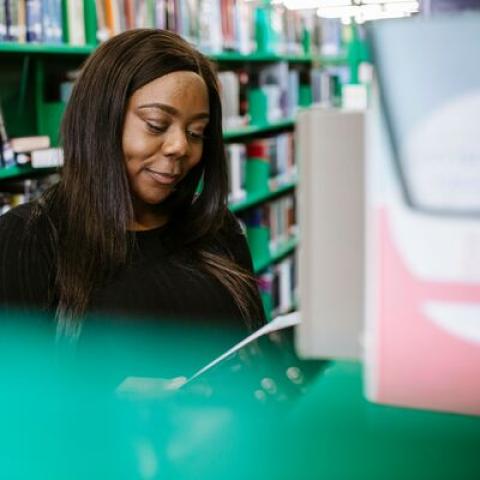
Showing content for section Overview
Overview
Where better to take your writing to the next level than the home city of literary greats like Charles Dickens and Sir Arthur Conan Doyle?
On this MA Creative Writing degree course, you'll study the genres that inspire you the most – from poetry and historical fiction, to screenwriting and crime – as well as genres you may not have explored, taking your writing in new directions.
You'll spend plenty of time writing and reviewing work and benefit from the help and experience of our expert lecturers. You'll develop the confidence to become a better writer by learning to critique your own work, and that of your peers. There's even the chance to take up a placement at a famous literary magazine.
If you're imaginative, ambitious, and ready to devote yourself to improving your writing, it's time to take your studies to the next level with us. This Master's in creative writing will give you the tools you need for a successful career as a writer, or in fields such as publishing, media, and education.
Number 6 in the UK for student satisfaction
We're ranked sixth in the UK for student satisfaction in creative arts and design in the 2024 Postgraduate Taught Experience Survey (PTES)
Eligibility
This course accepts UK, EU, and international students.
Course highlights
- Build confidence as a writer and consolidate your creative writing skills
- Get to grips with different writing techniques and study contemporary skills to inspire and entertain your audience through the power of the written word
- Complete a major project in the form of your own novel, screenplay or poem
- Participate in writers' workshops, where you'll develop your own skills and constructively contribute to the work of others
- Learn from our expert lecturers and creative writing academics, all of whom are published authors with a vast wealth of experience in the industry within their specialisms
- Learn about the market and current debates within differing genres
- Hear from accomplished guest speakers from the worlds of publishing and writing

Joining us as an international student
You'll feel at home in our international community and our diverse city. You'll be joining over 5,000 international students from more than 150 countries who are studying with us.
Learn more about international student life and how we can help you with visas, applications, arrival and settling in.
Contact information
Contact AdmissionsEntry requirements
Eligibility
This course accepts UK, EU, and international students.
September 2026 start
Qualifications or experience
- A second-class honours degree in a related subject. Equivalent qualifications and/or notable experience as a creative writer will also be considered.
Please get in touch if you're not sure if your undergraduate subject is relevant to this degree.
Equivalent professional experience and/or qualifications will also be considered, such as previous study, employment, voluntary work and training courses, including courses and qualifications you didn't complete. Learn more about our Recognition of Prior Learning (RPL).
If you're applying as an international student with a non-UK degree, you’ll need to show you meet the UK entry requirements listed above.
To find out if your non-UK degree or other qualification is accepted, please visit our page for your country and view the UK equivalent of your qualification.
- English language proficiency at a minimum of IELTS band 6.5 with no component score below 5.5.
You do not need an IELTS or equivalent certification if:
- you have a UK degree
- you have a degree from a majority English-speaking country (not taught by Distance Learning)
- you are a national of a majority English-speaking country
Degrees taught solely in English from non-majority English-speaking countries will be considered on a case-by-case basis. Find out more about our English language requirements.
If you don't meet the English language requirements yet, you can achieve the level you need by successfully completing a pre-sessional English programme before you start your course.
An online portfolio submission may be required as part of the selection process.
For more information on how to put together a portfolio, read our MA Creative Writing portfolio guide.
Course costs and funding
Tuition fees (September 2026 start)
- Full-time: £9,700
- Part-time: £6,470 (Year 1) and £3,230 (Year 2)
- Full-time: £17,900
- Part-time: £11,930 (Year 1) and £5,970 (Year 2)
If you're an EU student you may be eligible to receive our EU Scholarship.
University of Portsmouth graduates may receive a 20% alumni tuition fee discount.
Fees are subject to annual increase. Read our tuition fees terms and conditions.
You'll be able to pay your fees in instalments. Find out how to pay your tuition fees.
Funding your studies
Explore how to fund your studies, including available scholarships and bursaries.
If you're a UK student, you may be eligible for a Government Postgraduate Master's Loan, which you can use to help with course fees and living costs.
Loans, scholarships and bursaries
Browse funding such as the Government Postgraduate Loan, our scholarships for new and returning students, and subject specific loans.

Funding for international students
Learn more about sponsorships, scholarships and loans for students applying from outside of the UK.

Fees and funding for Master's courses
Explore Master's funding options, including loans, scholarships, bursaries and more.

Modules
What you'll study (full-time)
Core modules
This module takes you on a critical journey through various genres and time periods, from fairy tales to philosophy. Discover how to interpret writing through lectures, interactive workshops, and presentations. Hone your skills in understanding literature, crafting solid arguments, and using literary theories to refine your writing — be it prose, poetry, or scripts.
You’ll learn how to read critically in different situations, connecting with classic and contemporary authors. This will help you gather valuable knowledge to shape your unique writing style.
By the end of this module, you’ll have developed the analytical tools and creative techniques to enrich your writing and establish a voice that is distinctly your own.
The Writer’s Workshop offers a friendly environment to experiment with various types of writing. It will help you find what you love and where you excel. By writing in different formats, like prose and poetry, you’ll improve your technique and originality. Get help on how to draft and revise your work, learning to explain your creative decisions at every step.
By the end of the term, you’ll have sharpened your abilities and laid out a path for your final dissertation.
This seminar-focused module will introduce you to essential theories from academic criticism that apply to the art of writing. Through conversations, research, and hands-on activities, you'll explore timeless texts to grasp powerful writing principles. You’ll also critique these theories related to your own work, honing the ability to incorporate both original and scholarly sources effectively.
Dive into vital scholarly viewpoints to strengthen the core of your distinctive writing style.
With tutor guidance, you’ll refine your creative process. Apply analytical insight to elevate your work to a professional level. Your comprehensive portfolio will reflect your capacity for dedicated, autonomous work.
With this module, you can show how well you can blend genre-specific techniques with critical self-reflection. Through commitment and creativity, you’ll finish your course with a powerful testament to your talents.
You’ll use research, reading, and discussion to critically reflect on your skills and interests, setting the stage for an ambitious final project. Armed with genre knowledge and preparatory writing skills, you'll perfect your opening chapters or scenes through feedback. By examining your methods and considering feedback, you’ll enhance your technique and vision.
This module provides essential groundwork to resolve your ideas into a polished dissertation that showcases your writerly voice.
What you'll study (part-time)
Core modules
The Writer’s Workshop offers a friendly environment to experiment with various types of writing. It will help you find what you love and where you excel. By writing in different formats, like prose and poetry, you’ll improve your technique and originality. Get help on how to draft and revise your work, learning to explain your creative decisions at every step.
By the end of the term, you’ll have sharpened your abilities and laid out a path for your final dissertation.
You’ll use research, reading, and discussion to critically reflect on your skills and interests, setting the stage for an ambitious final project. Armed with genre knowledge and preparatory writing skills, you'll perfect your opening chapters or scenes through feedback. By examining your methods and considering feedback, you’ll enhance your technique and vision.
This module provides essential groundwork to resolve your ideas into a polished dissertation that showcases your writerly voice.
Core modules
With tutor guidance, you’ll refine your creative process. Apply analytical insight to elevate your work to a professional level. Your comprehensive portfolio will reflect your capacity for dedicated, autonomous work.
With this module, you can show how well you can blend genre-specific techniques with critical self-reflection. Through commitment and creativity, you’ll finish your course with a powerful testament to your talents.
This module takes you on a critical journey through various genres and time periods, from fairy tales to philosophy. Discover how to interpret writing through lectures, interactive workshops, and presentations. Hone your skills in understanding literature, crafting solid arguments, and using literary theories to refine your writing — be it prose, poetry, or scripts.
You’ll learn how to read critically in different situations, connecting with classic and contemporary authors. This will help you gather valuable knowledge to shape your unique writing style.
By the end of this module, you’ll have developed the analytical tools and creative techniques to enrich your writing and establish a voice that is distinctly your own.
This seminar-focused module will introduce you to essential theories from academic criticism that apply to the art of writing. Through conversations, research, and hands-on activities, you'll explore timeless texts to grasp powerful writing principles. You’ll also critique these theories related to your own work, honing the ability to incorporate both original and scholarly sources effectively.
Dive into vital scholarly viewpoints to strengthen the core of your distinctive writing style.
Changes to course content
We use the best and most current research and professional practice alongside feedback from our students to make sure course content is relevant to your future career or further studies.
Therefore, some course content may change over time to reflect changes in the discipline or industry. If a module doesn't run, we'll let you know as soon as possible and help you choose an alternative module.
Facilities
Writing and scripting software

Open Access Suite

University Library

How you'll spend your time
We recognise that you'll probably be juggling more demands when you do your Master's degree, as you may be working or you may have family responsibilities.
We'll give you as much indication here as we can of how much time you'll need to be on campus and how many hours you can expect to spend in self-directed study, but please note that these indications are always subject to change. You should receive your full timetable several weeks before you start with us.
Course structure
This Master's degree will take:
- 1 year (full-time study)
- 2 years (part-time study)
You can expect:
- 1 day of teaching per week (pro rata for part time students)
- Around 20–25 hours of dedicated independent study each week (pro rata for part time students)
Teaching
Teaching
Master's study is deeper and more specialised than an undergraduate degree. This means you'll focus on something that really matters to you and your career as you work closely with academics committed to the subject.
You'll spend more time in independent study and research than you did for your undergraduate degree, but the majority of your teaching time will be in-person and face-to-face.
Teaching methods on this course include:
- workshops
- independent writing
- critical analysis
Assessment
You'll be assessed through:
- creative writing projects
- final creative writing project
Teaching staff
These are some of the expert staff who'll teach you on this course:
Term dates
September start
The Master's academic year runs from September to the following September. There are breaks at Christmas and Easter. Over the summer you'll be writing your project/dissertation.
Career development
Careers this Master's in Creative Writing prepares you for
As a successful graduate of this course, you'll have experienced an exciting immersion into writing, with the freedom and discipline of writing across multiple forms to express your unique narrative voice.
Through workshops, independent writing and critical analysis, this creative writing Master's course will help you to develop your own skills and constructively contribute to the work of other writers.
When you graduate, you'll have completed a major project in the form of your own novel, screenplay or poem, and have developed the necessary confidence and critical skills to continue a career in writing, or in fields such as publishing, media, and education.
Graduates of this course have gone onto roles in:
- Publishing
- Editing
- Teaching
- Media
- Writing
- Journalism
- Public Relations (PR)
- Education
Recent graduates of this course have found jobs such as:
- Account Executive
- Article portfolio writing
- Freelance sports journalist
- Freelance writer
- Lecturer
- Social Media Manager
Career outcomes shown are sourced from the latest available graduate outcome surveys. The data shows career outcomes at 15 months after graduation.
Career planning
During your course, you'll have expert career support from your tutors and from our Careers and Employability Centre, which you can access for 5 years after you graduate.

You'll benefit from:
- Networking events and industry links, including the opportunity to attend five industry parties at The London Magazine
- 1-to-1 appointments
- CV and cover letter advice
- Interview preparation and practice
- Workshops to enhance your employability skills
- Recruitment events including the Student and Graduate Opportunities Fair
- Support starting your own business
Placements and industry connections
There is the opportunity to either work in London at The London Magazine offices for a two-week placement, or undertake a virtual placement working at The London Magazine dealing with submissions to the magazine.
All teaching staff are published authors and have a vast wealth of experience in the industry within their specialisms.
Supporting you
Master's study is more focused on independent learning than undergraduate study, but you'll get lots of support via video, phone and face-to-face from teaching and support staff to enhance your learning experience and help you succeed. You can build your personalised network of support from the following people and services:
Types of support
Your personal tutor helps you make the transition to independent study and gives you academic and personal support throughout your time at university.
You'll have regular contact with your personal tutor in learning activities or scheduled meetings. You can also make an appointment with them if you need extra support.
If you require extra support because of a disability or additional learning need our specialist team can help you.
They'll help you to
- discuss and agree on reasonable adjustments
- liaise with other University services and facilities, such as the library
- access specialist study skills and strategies tutors, and assistive technology tutors, on a 1-to-1 basis or in groups
- liaise with external services
You can get personal, emotional and mental health support from Student Wellbeing, in person and online. This includes 1–2–1 support as well as courses and workshops that help you better manage stress, anxiety or depression.
Library staff are available in person or by email, phone, or online chat to help you make the most of the University’s library resources. You can also request one-to-one appointments and get support from a librarian who specialises in your subject area.
The library is open 24 hours a day, every day, in term time.
If English isn't your first language, you can do one of our English language courses to improve your written and spoken English language skills before starting your degree. Once you're here, you can take part in our free In-Sessional English (ISE) programme to improve your English further.
How to apply
Unlike undergraduate applications, which go through UCAS, applications for this Master's course are made directly to us.
There's no deadline for applications to this course. We accept applications right up until the start date in September, as long as there are places available. If you wait until September to apply, you may find that the course is full.
If you're applying as an international student, remember that you'll need to leave plenty of time to get your visa organised.
You can find more advice about applying in our Master's application checklist. International students and current students and recent graduates of the University of Portsmouth also have some different application options, which are detailed below.
Extra information for international students
If you're an international student, you can apply directly to us using the same application form as UK students.
You could also get an agent to help with your application. Check your country page for details of agents in your region. To find out what to include in your application, head to the how to apply page of our international students section.
If you don’t meet the English language requirements for this course yet, you can achieve the level you need by successfully completing a pre-sessional English programme before you start your course.
Ready to apply?
I'm a current Portsmouth student, or a recent Portsmouth graduate
If you're currently in your final year of study at Portsmouth, or you graduated since July 2024, you're eligible to make a fast track application. You'll have:
- a shorter application form to complete
- access to the 20% Alumni fee discount
- a guaranteed conditional offer, for most Master's courses
After you apply
Once we receive your application, we may ask you for further information. We will then either make you an offer or suggest alternatives if your application is unsuccessful.
You'll usually get a decision within 10 working days, so you shouldn't have to wait too long. Some courses have an interview stage – we'll let you know if you need to prepare for one.
Learn more about how we assess your application.
Admissions terms and conditions
When you accept an offer to study at the University of Portsmouth, you also agree to abide by our Student Contract (which includes the University's relevant policies, rules and regulations). You should read and consider these before you apply.

